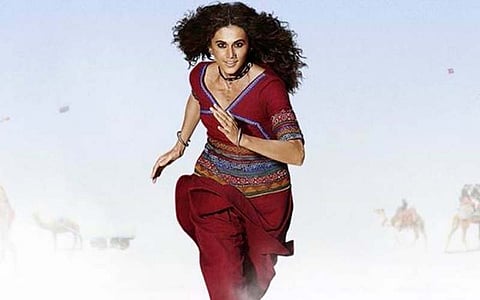
- Reviews
- Power List 2024
- Cannes 2024
- In-Depth Stories
- Web Stories
- News
- FC Lists
- Interviews
- Features
- FC SpecialsFC Specials

Director: Akarsh Khurana
Writers: Kanika Dhillon, Aniruddha Guha
Cast: Taapsee Pannu, Priyanshu Painyuli, Supriya Pathak, Abhishek Banerjee, Supriya Pilgaonkar
Cinematographer: Neha Parti Matiyani
Editors: Ajay Sharma, Shweta Venkat
Streaming on: ZEE5
What constitutes a woman? Is it her testosterone level? Or her physique? Or her choice of clothing? Or her demeanor? Or her decision to become a wife and mother? That is the larger question that Rashmi Rocket is addressing. The film is, as far as I can tell, the first in Indian cinema to focus on gender testing in sport. The practice, which has been prevalent since the 1950s, is designed to distinguish between biological males and females with the aim of providing a level playing field for athletes. Over the years however, it has become a controversial and messy minefield, which perpetuates the patriarchy and rigid binary ideas about gender.
Rashmi Rocket is fiction but the writers – the story is by Nanda Periyasamy, the screenplay by Aniruddha Guha and additional screenplay by Kanika Dhillon – were clearly inspired by the lives of local athletes whose careers were damaged by the test, namely Santhi Soundarajan and Dutee Chand. Santhi, who belongs to a Dalit family, was the first Tamil woman to win an Asian Games medal. But after the 2006 Asian Games, she was told that she had failed the sex test. Overnight, her career collapsed and she even attempted suicide. Dutee was dropped from the 2014 Commonwealth Games after she failed the hormone test. She contested the ruling. The Court of Arbitration for Sport eventually ruled in her favor allowing her to take part in the 2016 Rio Olympics. Like Dutee, Rashmi fights the charge against her, which is that she has too much testosterone in her body to be properly female.
Rashmi Rocket begins as a soaring sports saga but pivots into a courtroom drama. Rashmi, the daughter of a tour guide in the Kutch, is born with a formidable ability to run. Early in the film, on Uttarayan, we see her race faster than the boys to retrieve her mother's kite. A man looks at her and wonders, 'Chora hai ki chori?' This question dogs her through her life. As an adult, Rashmi drives a motorcycle. She is tough, fiercely independent and at least for the first hour, dressed in mostly pants, shirts, shorts and tracksuits. This inexplicably changes to pretty salwar kameezes in the second half as she becomes more domesticated. Is the film telling us that more conformist life choices also seep into your wardrobe? Or is she purposefully attempting to dress in a more traditionally feminine way because her femininity has been questioned? I have no idea.
Rashmi Rocket is a bit of a muddle. The film is situated between fact and fiction. Director Akarsh Khurana, his team of writers and leading lady Taapsee Pannu are trying to translate a complex, little-known subject into accessible and entertaining cinema. The attempt is well-intentioned and brave but not entirely successful. For one, the film about an unconventional woman is far too conventional. The film relies too much on tropes, starting with the Gujarati backdrop. Apart from the kite festival, we get heavily accented Hindi, the mirror-work outfits and even a catchy but wholly unnecessary dance number 'Ghani Cool Chori' in which Rashmi wears a ghagra with sneakers. The lovely Supriya Pathak is Bhanu Ben, Rashmi's fierce mother – essentially the good version of the deadly matriarch she played in Goliyon Ki Raasleela Ram-Leela. And the reliable Manoj Joshi plays Rashmi's father – essentially a bite-sized version of the loving, supportive dad that he played so brilliantly in Hasee Toh Phasee.
Rashmi's relationship with her parents resonates emotionally. Both the mother and daughter are wonderfully stubborn. Her relationship with her partner Gagan is also rendered with care. It helps that Gagan is played with just the right note of understated masculinity by Priyanshu Painyuli. But the writing falters when it comes to the plotting of Rashmi's rise and fall. The film resorts to cliches such as an upper-class rival. And of course, the training montage.
The tonality is both self-aware and high-pitched. Especially in the court scenes. Abhishek Banerjee plays Eeshit, a lawyer who persuades Rashmi to take her case to court. Early in the hearing, the judge tells Eeshit that he must have seen too many Hindi films. She says: Itna drama nahi hota hai court mein. But drama is precisely what unfolds. Some of it is gripping. But some just plays out as juvenile. Eeshit seems fumbling and nervous at first but then of course proves himself to be more than capable. He goes up against his former boss, who is smug and confident that the Association will win. But he also takes a moment to make a snide comment to Eeshit about returning to work with him as an intern after he loses. The sneering, which reminded me of old-school Bollywood bad guys, just seemed out of place with the subject.
It's half-baked moments like this that stop Rashmi Rocket from taking flight. Taapsee, as usual, is competent and importantly, looks the part. I didn't doubt for a moment that she could do what she was doing. But I wonder if the actor is in danger of becoming her own stereotype. By which I mean doing so many women-of-steel characters that they start to merge into one another.
I think Abhishek had the most fun in this film – in the time-honored tradition of Hindi film lawyers, he chews the scenery, berating, cajoling and thundering. This is the best part of the film.
You can watch the film on ZEE5.